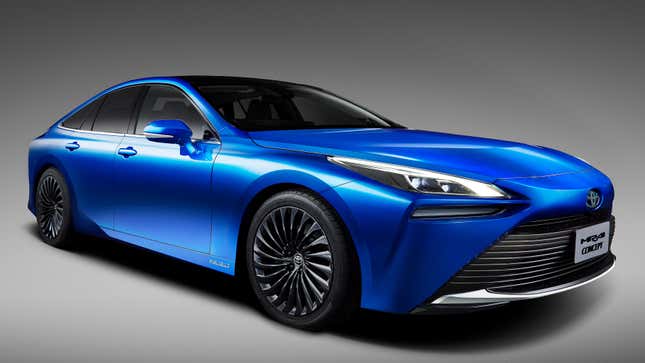
Toyota’s made no secret of its hydrogen fuel cell ambitions. A new joint venture with five companies in China means it’s digging in even deeper.
The venture, for now, is pretty modest, Bloomberg reports. But it is the continuation of development of a still-interesting corner of the alternative fuel world. It’s one that increasingly has me thinking battery electric vehicles are more a bridge technology than any kind of endgame.
From Bloomberg:
The new Beijing-based entity, which will be 65 percent owned by Toyota, will be called United Fuel Cell System R&D and start with an initial investment of 5 billion yen ($46 million).
Toyota has been one of the biggest backers of fuel cells among global automakers, betting that they can become a source of energy for electric vehicles on par or even better than batteries. The new partnership underscores Toyota’s continued interest in fuel cells, especially for commercial applications such as buses and trucks. Annual sales of fuel cells are on track to reach 1 million vehicles by 2035, according to BloomberNEF, driven by growth of buses and commercial vehicles mainly in China, Korea, Japan and Europe.
“China is really trying to commit to fuel cells,” said Seiji Sugiura, an analyst at Tokyo Tokai.
The six companies will try to develop low-cost fuel cell systems while improving drive performance, fuel efficiency and durability, they said in a statement. FAW and Dongfeng are two of three central government-owned automaking groups in China, and Toyota has already partnered with Guangzhou Auto and China FAW to develop fuel cell vehicles. Beijing Auto and GAC are partners with foreign carmakers including Daimler AG and Honda Motor Co.
The main argument against fuel cell is that it is a less efficient way of powering an electric car, since we still do NOT have ways of making hydrogen that doesn’t use significantly less energy than how we generate the electricity that goes into lithium-ion batteries, from the power grid.
And while that may be true, the upside of fuel cell tech is that it is more scalable than battery-electric technology. You can see a future where planes, trains, and long-haul semis are all powered by fuel cells, three kinds of vehicles that for obvious reasons battery-electric propulsion isn’t ideal. And if you can find a green way to make hydrogen, well, you’d be off to the races.
Still, as things currently stand, a fuel cell’s environmental costs compared to battery electric are about even.
From The Week:
Jon Hunt, Toyota’s head of commercialisation of hydrogen fuel cell cars, told Auto Express that manufacturing a lithium-ion battery for an electric car is a “very energy-intensive” process.
“As an example, a 100kWh battery will give a potential range of 250 miles and, in order to produce that battery, it will take around 20 tonnes of CO2,” he said. “A typical battery lasts for 150,000 miles, so that equates to around 83g/km of CO2. Then, when you take into account charging over that same distance, the same battery car will deliver 124g/km of CO2 over its lifetime.”
By comparison, Auto Express says that a recent study found that a Toyota Mirai hydrogen fuel cell car produces around 120g/km of CO2 over its lifetime when the manufacturing process is taken into account. But if hydrogen were to be produced by renewable energy, that figure could be reduced significantly.
The U.S. Department of Energy has a good outline here of how we currently make hydrogen in this country, including at least one way that is renewable:
Electrolysis: An electric current splits water into hydrogen and oxygen. If the electricity is produced by renewable sources, such as solar or wind, the resulting hydrogen will be considered renewable as well, and has numerous emissions benefits. Power-to-hydrogen projects are taking off, where excess renewable electricity, when it’s available, is used to make hydrogen through electrolysis.
None of this sounds particularly efficient at the moment but I do know, big picture, we will eventually have to figure out a way to power vehicles without oil or batteries. The best evidence for that is that companies like Toyota are betting real money on it. And while battery technology has improved markedly in the past decade, the most hopeful section of the Department of Energy’s page is the listing of hydrogen production methods in development.
Those include high-temperature water splitting, photobiological water splitting, and photoelectrochemical water splitting, all of which are more renewable ways of splitting hydrogen off from water. None of which is really sexy but hey we’re just trying to save the world here.